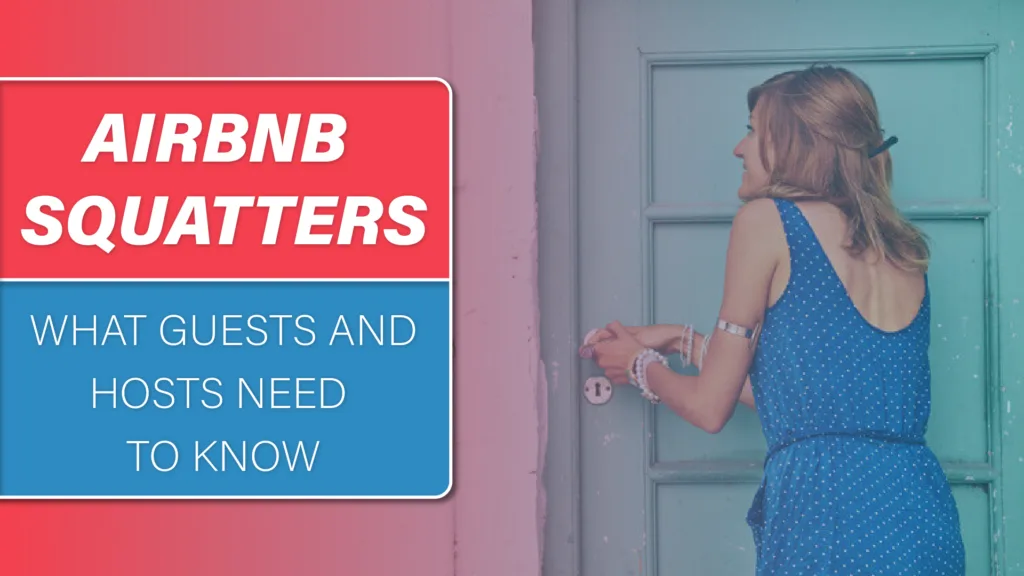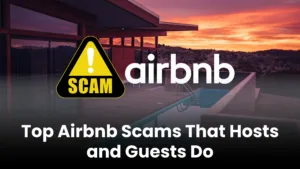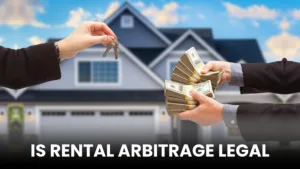
Recently, The Independent highlighted a shocking story of an Airbnb host battling to reclaim her own home from squatters. Despite numerous attempts to involve airbnb and local law, the host found herself powerless, facing an ordeal that had dragged on for months.
So, it is now important to pay heed to the fact that the increasing prevalence of squatting on Airbnb, an issue that has grown alongside platforms popularity. While airbnb has enabled countless hosts to monetize their properties, incidents like these show that hosts can face unexpected risks when guests exploit legal loopholes to overstay. As more hosts report the similar issues, the demand for stronger protections and preventive measures on Airbnb continues to rise.
This article will dive into the nature of Airbnb squatting, the legal gray areas, and steps hosts can take to protect themselves from becoming the next viral story.
Understanding Airbnb Squatting and The Legalities
To simply put, Airbnb Squatting happens when a guest refuses to leave the property even after their booking has ended, using the legal loopholes to remain in the host’s home. This is a rapidly increasing issue, particularly in the places where local laws provide strong tenant protections. Squatters can turn a host’s short-term rental into a lengthy legal and financial headache, sometimes gaining “tenant” rights after a certain number of days. Many hosts are surprised to learn that both airbnb and local authorities may be limited in what they can do, leaving the hosts with the costly and time consuming task of pursuing an eviction through courts.
This issue can be quite upsetting for hosts that rent out their primary residence or vacation homes as they expect a quick return of their space.
Legalities | Explanation |
Automatic Tenant Rights | In some places, guests gain tenant rights after 30 days, complicating removal efforts. |
Limited Airbnb Support | Airbnb typically won’t intervene in squatting cases, placing the burden on the host. |
Eviction Process Costs | Hosts must often pursue formal eviction, which can be lengthy and costly. |
Jurisdictional Issues | Local laws and tenant protections vary, making it difficult for hosts to understand their rights. |
Impact on Property Value | Squatting can damage a property’s reputation, leading to decreased interest and bookings. |
Red flags to be aware of Airbnb Squatters:
To be aware of potential squatters, hosts should be alert for certain red flags. Here are some signs that they can spot early that will save them from a whole lot of panic.
Longer Booking Requests
Requests for 28 days or longer may indicate an intent to gain tenant rights in areas where 30-day stays automatically qualify for tenancy protections. Be cautious of guests trying to extend their stay just under this threshold.
Last-Minute Extensions
Squatters often request last-minute extensions beyond their original booking, particularly after they’ve already arrived, aiming to “settle in” without raising early alarms.
Reluctance to Provide ID or Background Info
Legitimate guests typically don’t mind verifying their identity. Be wary if a guest is unwilling to share identification or appears to be hiding information about their profile.
Offers to Pay Outside Airbnb
If a guest suggests paying off-platform, this can void Airbnb’s protections and refund policies, putting the host at risk.
Excessive Questions about Property Policies
Questions like “How strict are your rules on evictions?” or “What’s the process for extending my stay?” may seem unusual and indicate that the guest has plans beyond the booking.
New Profiles with No Reviews
While not always suspicious, a brand-new profile with no reviews can be a red flag, especially if the guest asks for extended stays or offers to pay in cash.
Minimal Communication After Booking
Squatters may try to limit contact or communication once their booking is confirmed, trying to avoid any questions that could reveal their intentions.
Risks And Consequences of Airbnb Squatters for Hosts:
Airbnb Squatters can bring about so many risks and consequences that are no less than a drawn-out nightmare. Here are the main ways squatters can impact hosts:
- Financial Loss
- Legal Battles
- Property Damage
- Damage to Reputation
- Increased Insurance Premiums or Policy Voids
- Emotional Stress
Financial Loss
When squatters refuse to leave, hosts may face a loss of rental income for weeks or months as they navigate eviction processes. Legal fees, missed bookings, and potential property damage can add up quickly creating a major financial strain.
Legal Battles
In many areas, squatters can claim tenant rights after a certain number of days, making it challenging for hosts to remove them. Hosts may need to go through formal eviction proceedings, which are time-consuming, costly, and often stressful.
Property Damage
Squatters are less likely to respect the property, potentially leaving behind damages or unpaid utility bills. Repairs and cleaning fees, especially for intentional damage, can quickly reduce a host’s profit margins.
Damage to Reputation
Squatting incidents can harm a host’s reputation on Airbnb, especially if the issue is visible in reviews or results in negative feedback. Future guests may hesitate to book, fearing similar issues or poor host experiences.
Increased Insurance Premiums or Policy Voids
Some insurance policies may not cover damages caused by squatters, leaving the host without financial help to cover losses. Frequent issues may also result in higher premiums or, in severe cases, policy cancellations.
Emotional Stress
The frustration and helplessness of dealing with squatters can weigh heavily on hosts, especially if they depend on rental income. The strain of legal and financial consequences often leads to emotional burnout.
Tips for Dealing with Airbnb Squatters in Real-Time
If you suspect that a guest is trying to squat in your Airbnb property, taking quick, calculated steps can help resolve the situation more effectively. Here’s what you can do in real time:
- Contact Airbnb Support Immediately
- Document Everything
- Politely Reaffirm the Booking Terms
- Avoid Confrontation and Stay Professional
- Leverage Local Tenant-Landlord Laws
- Consult a Legal Expert
- Keep Safety Measures in Place
- Consider an Insurance Claim if Damages Occur
1. Contact Airbnb Support Immediately
Report any suspicious behavior to Airbnb as soon as possible. Provide detailed communication records and evidence that the guest is refusing to leave. The sooner Airbnb is involved, the more they may be able to assist.
2. Document Everything
Keep a record of all communications, agreements, and any damages with photos and videos. This documentation can support your case in both Airbnb’s resolution center and any legal actions if needed.
3. Politely Reaffirm the Booking Terms
Remind the guest of the checkout time and policies outlined in your listing. Reiterate any agreements, such as cleaning fees, extensions, or damage deposits, to set clear boundaries.
4. Avoid Confrontation and Stay Professional
If the guest becomes argumentative or uncooperative, avoid escalating the situation. Approach them professionally and do not attempt any direct actions that might violate local laws, as this could backfire legally.
5. Leverage Local Tenant-Landlord Laws
In certain areas, even short-term guests may claim tenant rights after staying for a specific period. Research your local laws on tenancy rights to understand what legal options are available and when formal eviction proceedings may be necessary.
6. Consult a Legal Expert
If the guest continues to refuse to leave, contacting a legal professional who specializes in landlord-tenant law can clarify your rights. They can guide you through the formal eviction process if it becomes unavoidable.
7. Keep Safety Measures in Place
Ensure that you have security features like smart locks and cameras (for entrances only, as per Airbnb rules). These can discourage squatters from extending their stay and help monitor any unauthorized activity.
8. Consider an Insurance Claim if Damages Occur
If property damage is evident, take photos and contact your insurance provider as well as Airbnb’s Host Guarantee program. While this doesn’t always cover every situation, it can help recover costs associated with squatting.
Can Airbnb Protect Hosts against Squatters?
Airbnb offers limited protection against squatters, which can leave hosts vulnerable in some cases. While Airbnb’s policies include a “Host Guarantee” for property damage, this coverage doesn’t directly address issues with squatters or evictions. Here’s a breakdown of what Airbnb can and can’t do for hosts facing squatters:
1. Host Guarantee
Airbnb’s Host Guarantee may help cover damages caused by guests during their stay, but it doesn’t address lost income or legal fees if a guest refuses to leave. Additionally, the guarantee has limitations and may not cover all damages.
2. Terms of Service and Extended Stays
Airbnb discourages hosts from accepting bookings longer than 28 days in certain regions, as local laws may grant squatters or tenant rights for stays of 30 days or more. By limiting booking durations, hosts can avoid accidentally giving guests tenancy rights, though this is not a foolproof protection.
3. Support for Off-Platform Legal Disputes
In the event of a squatting issue, Airbnb will typically advise hosts to consult local laws and, if necessary, begin formal eviction proceedings. Unfortunately, Airbnb doesn’t intervene in legal disputes, meaning hosts are on their own if a guest gains tenancy rights or refuses to vacate.
4. Proactive Guest Vetting Tools
Airbnb has basic guest vetting measures, including ID verification and reviews, but hosts may want to use additional tools or set stricter booking criteria to screen potential squatters more effectively.
In short, Airbnb offers minimal direct protection against squatters. Hosts can reduce their risk by understanding local laws, avoiding extended stays, screening guests carefully, and knowing when to involve local authorities. For hosts who rely on their property as a source of income, additional landlord insurance may offer better protection in case of squatting situations.
What are the Legal Steps to Evict Squatters from Airbnb Properties?
Dealing with squatters on Airbnb property can be quite challenging, especially if local laws start granting guests tenants rights after a certain period. Here is a step by step guide to help hosts navigate the eviction process.
- Understand Local Laws on Tenancy Rights
- Document the Situation Thoroughly
- Issue a Formal Eviction Notice
- Seek Mediation or Legal Assistance
- File for Eviction in Court
- Engage Local Authorities (If Permitted)
- Strengthen Future Protections
1. Understand Local Laws on Tenancy Rights
Different regions have varying laws on when a guest becomes a tenant, often after a 30-day stay. Familiarizing yourself with these laws is crucial to know when a squatter might legally be considered a tenant and require formal eviction.
2. Document the Situation Thoroughly
Keep detailed records, including booking confirmations, communication with the guest, and any relevant photos of the property before and after their stay. This documentation can be invaluable if you need to provide evidence in court.
3. Issue a Formal Eviction Notice
If the guest has gained tenant rights, you may need to serve an eviction notice per local regulations. This notice should outline the reason for eviction, such as an expired booking or unauthorized stay, and give the squatter a deadline to vacate. Be sure to follow the proper format and timeframe for your area.
4. Seek Mediation or Legal Assistance
If the squatter doesn’t comply, consult a local attorney experienced in landlord-tenant disputes. In some cases, mediation may resolve the issue, while in others, you may need to initiate formal eviction proceedings.
5. File for Eviction in Court
Should the squatter refuse to leave after the notice period, the next step is to file an eviction lawsuit. This process can take several weeks to months, depending on local court schedules. Bring all relevant documentation, including proof of the original Airbnb booking, to support your case.
6. Engage Local Authorities (If Permitted)
Once an eviction is granted, law enforcement can often help enforce the court order and remove the squatter. Ensure you have all required legal approvals before requesting police involvement, as unauthorized removal attempts can lead to legal consequences.
7. Strengthen Future Protections
After the incident is resolved, take additional measures to prevent squatting in the future, such as setting booking limits, adding security deposits, and screening guests more thoroughly.
Each jurisdiction has unique eviction protocols, so working with a qualified attorney can help ensure compliance with local laws.
What Are Airbnb Squatters' Rights?
Airbnb squatters’ rights typically hinge on local tenancy laws, which vary widely by region. In many areas, a guest staying beyond a certain duration—often 30 days—can gain tenant rights, even if they initially booked through a short-term rental platform. Here’s a breakdown of common squatters’ rights and legal considerations for Airbnb hosts:
1. Tenant Rights After Extended Stays
In many places, if a guest stays for 30 days or more, they may be entitled to legal tenant protections. This means they cannot be removed without going through formal eviction procedures, regardless of the original Airbnb agreement. In some jurisdictions, tenant rights can apply even sooner.
2. Formal Eviction Process Required
When guests gain tenancy rights, hosts are legally required to issue an eviction notice and follow proper legal channels to remove them. This can involve filing for an eviction in court and, in extreme cases, using law enforcement to enforce the eviction order.
3. Rights to Habitability
Guests who gain tenant status may also have the right to habitability standards, meaning the property must remain safe and livable. Any attempts by hosts to force out squatters by shutting off utilities or changing locks could lead to legal consequences, as these actions violate tenant protections in many areas.
4. Limitations on Host Intervention
Once tenant rights are established, hosts have limited control over their own property and may face restrictions on entering the premises without notice. Attempting to forcibly remove or intimidate the squatter can lead to fines or penalties.
For Airbnb hosts, understanding local laws on tenant rights is essential, especially if they regularly host longer-term guests. Proactively setting stay limits, using strict screening measures, and knowing when to involve legal authorities can reduce the risk of dealing with squatters. Hosts can also check Airbnb’s terms of service and local landlord-tenant laws to navigate this issue better.
By knowing their legal standing and taking the right preventative steps, Airbnb hosts can protect their properties from long-term squatters more effectively.
How to Avoid Airbnb Squatters?
Preventing squatters on Airbnb starts with careful guest selection and booking management. Hosts can lower their risk by setting clear rental periods, ideally under 30 days, as many local laws grant tenancy rights after this timeframe. Keeping shorter booking durations and implementing strict policies helps prevent a guest from unintentionally gaining tenant rights. Additionally, limiting last-minute or long-term bookings for new profiles or guests without verified IDs can help ensure you’re hosting trustworthy individuals. Screening guests by carefully reading their reviews and encouraging transparent communication can further signal a guest’s intentions, building initial trust.
Security deposits and clear, enforceable rental agreements also add a layer of protection. Security deposits can act as a deterrent for guests who might otherwise consider taking advantage of a property. Hosts may also consider implementing smart security measures like keyless entry systems that can be reprogrammed for each guest. Tools like Airbnb’s identity verification feature offer added assurance, while frequent property check-ins or using a trusted co-host can help monitor the property closely. By combining these practical steps, hosts can significantly reduce the risk of squatters and maintain control over their Airbnb property.
Airbnb Squatters: Frequently Asked Questions (FAQs)
What is an Airbnb squatter?
An Airbnb squatter is a guest who refuses to leave after their booking ends, often exploiting tenancy laws to stay on the property without payment or permission.
How do Airbnb guests gain squatter rights?
In some regions, guests who stay beyond a certain period (often 30 days) gain tenant rights, which may require formal eviction to remove them.
Can Airbnb help hosts evict squatters?
Airbnb’s involvement is limited, as tenancy laws fall under local jurisdiction. While they may assist with customer service, hosts often need to handle legal eviction themselves.
What red flags indicate a potential squatter?
Red flags include guests requesting extended stays, reluctance to provide verification, vague communication, or attempting to bypass Airbnb's messaging and payment platforms.
What preventive steps can hosts take to avoid squatters?
Setting short rental periods, requiring verified IDs, screening guest reviews, using security deposits, and monitoring stays are effective preventive measures.
Does Airbnb provide insurance or protection for squatters?
Airbnb’s Host Guarantee offers some coverage for property damage, but it doesn’t directly address squatters. Hosts should check local laws and consider private insurance for added protection.
What legal steps should a host take to evict a squatter?
Hosts typically need to issue a formal eviction notice, follow local eviction laws, and may need to file a legal eviction through the courts.
Can a host shut off utilities to remove a squatter?
No, cutting off utilities to force a guest out is usually illegal and may lead to fines or legal repercussions for the host.
How can I trust my Airbnb guest won’t become a squatter?
Trust can be built through guest screening, requiring verified profiles, communicating via Airbnb’s platform, and monitoring guest activities closely.
What should I do if I think my guest may become a squatter?
Reach out to Airbnb support for guidance, review local laws regarding tenant rights, and consult with a lawyer if you anticipate issues with removing the guest.








